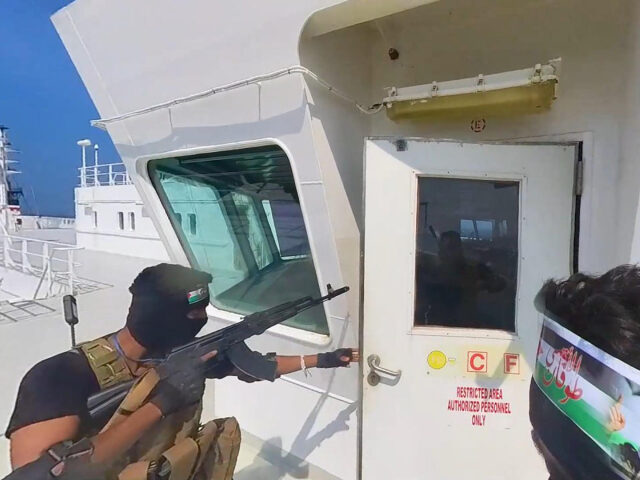Tuesday marked the one-year anniversary of the Iran-backed Houthi terrorists of Yemen seizing the car carrier MV Galaxy Leader and taking its crew hostage.
The crew remains in captivity, reportedly living aboard their ship under Houthi guard.
The Houthis illegally seized the Galaxy Leader in a commando raid as it was sailing through international waters in the Red Sea on November 19, 2023. The ship is flagged from the Bahamas, owned by a British-based shipping company called Galaxy Maritime, operated by a Japanese corporation, and crewed by 17 Filipinos, 3 Ukrainians, 2 Bulgarians, 2 Mexicans, and one Romanian. It was en route to India at the time of the attack.
The Houthis attempted to justify their act of piracy by claiming the ship was linked to Israel because Galaxy Maritime is a unit of Ray Car Carriers, a company founded by Israeli billionaire Abraham “Rami” Ungar. The hijacking of the Galaxy Leader was one of the first major Houthi pirate attacks in support of Hamas after the Gaza war began.
“All ships belonging to the Israeli enemy or that deal with it will become legitimate targets,” the Houthis declared in November 2023. The insurgents have launched over a hundred attacks against Red Sea shipping since then, mostly using ballistic missiles and drones. Two ships have been sunk by their attacks, and four crew members were killed.
“It seems incredible that a year has passed, and the crew of the Galaxy Leader are still being held hostage. Innocent seafarers and families who have had their lives irrevocably changed by geopolitical forces wholly out of their control,” Guy Platten, secretary of the International Chamber of Shipping, said on Tuesday.
“The seafarers, some of whom have been at sea for nearly two years, have been held against their will only limited contact with their families, friends, and loved ones. This is unconscionable and must not be allowed to endure,” Platten said.
“We are thinking of the seafarers and all of those affected at this time, and we continue to call for humanity to prevail and their immediate release,” he said.
The Philippine government has made several pleas for the release of its citizens, to no avail. In August, the Philippine Department of Foreign Affairs said several of the captive crew members were in poor health, including some who displayed symptoms of malaria.
In October, the Philippine government said negotiations for the release of the Galaxy Leader crew were at an “impasse,” with the Houthis insisting the hostages will not be freed until the Gaza war ends. Philippine Department of Foreign Affairs Undersecretary Eduardo de Vega said the Houthis are allowing the captives to make weekly phone calls to their families.
“We want the war in Gaza to end because it will affect the fate of 17 Filipino seafarers who are still being hostaged in Yemen by the Houthis,” De Vega said.
The Biden administration has been almost completely ineffectual at stopping the Houthi attacks, despite launching an operation to protect international shipping called Prosperity Guardian with much fanfare in December 2023. The European Union fared a little better with its Operation ASPIDES, launched in February 2024. India declined Biden’s invitation to join Operation Prosperity Guardian, but began sending its own warships into the Red Sea and the Arabian Sea in January 2024.
The Houthis announced they would grant safe passage to their allies Russia, China, and Iran early in 2024, prompting some ship captains to try slipping past Houthi missile and drone attacks by claiming to be Chinese or Russian vessels.
Rumors are circulating that the Houthis are “monetizing” their Red Sea blockade by selling safe passage to shipping companies for up to $180 million per month. The U.N. Security Council (UNSC) investigated these reports in October and found them plausible, although they could not verify whether any payments had taken place.
Some maritime industry experts questioned the protection money reports because they doubted the Houthis’ informal financing system, known as “hawala,” could handle massive clandestine payments from shipping companies.
In a similar situation a decade ago, Somali pirates raked in huge profits with a protection racket, but in that case the victims were able to pay off the Somalis by simply tossing suitcases of cash out of helicopters. Houthi terrorism is centrally directed, so handing bundles of money to individual corsairs would not work.
The Houthis actually have an agency, fiendishly named the Humanitarian Operations Coordination Center (HOCC), that communicates with shipping companies and tells them whether they can expect to be attacked if they transit the Red Sea. If the Houthis are running a protection racket, it is almost certainly managed from HOCC headquarters.
The money lost to increased insurance costs and longer transit times to avoid the Red Sea route are considerably higher than the rumored Houthi demands for protection money. Houthi attacks have reduced revenue from Egypt’s Suez Canal by some $2 billion per year, a blow the Egyptian economy was not well-positioned to absorb. The Egyptian government said in April it has lost over $6 billion due to Houthi piracy.
Insurance costs for shipping have more than doubled, and so have overall freight costs from Asia to Europe. Every shipment rerouted around Africa to avoid the Red Sea adds at least a million dollars to its cost. Houthi terrorism has also dramatically increased the cost of humanitarian shipments to catastrophe zones like Sudan — and Yemen itself.

COMMENTS
Please let us know if you're having issues with commenting.